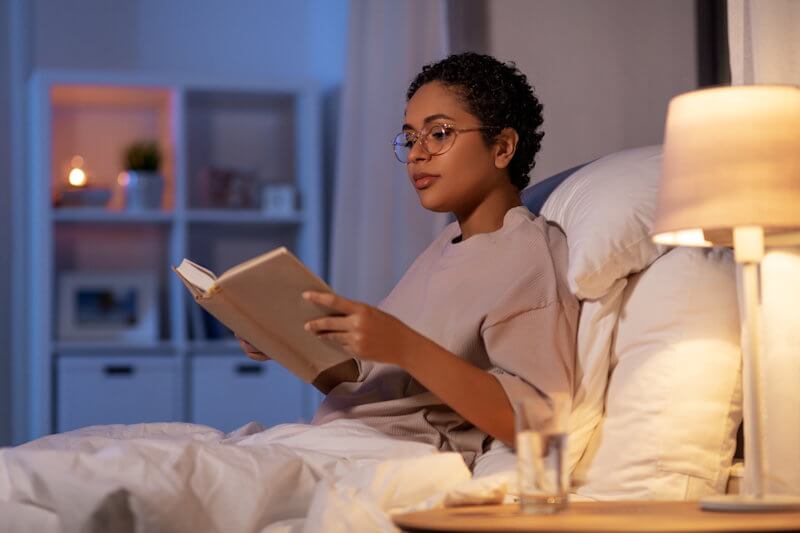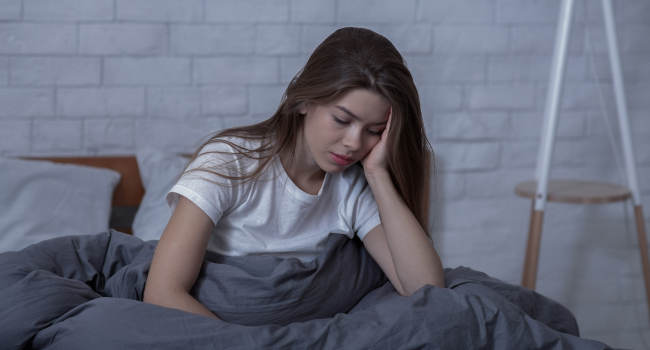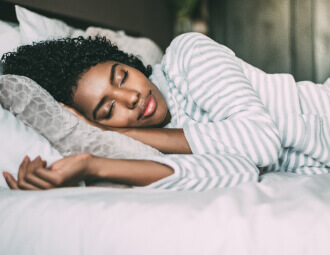Highlights
- Comorbid insomnia is a type of sleep disorder that co-exists with other health problems. It can aggravate the symptoms of co-existing conditions, increase stress sensitivity, and lower overall quality of life.
- Signs of comorbid insomnia tend to show up in the form of interrupted sleep cycles, as well as daytime trouble focusing and regulating emotions.
- Several medical or psychiatric conditions can be interconnected with insomnia, being its cause, consequence, or part of an ongoing cycle.
- Insomnia can be treated with medications, psychotherapy, and self-help techniques.
Insomnia casts a shadow on the lives of millions, but for a person with an underlying health issue, sleep deprivation can cause even more struggles.
In short, comorbid insomnia means that this sleep disorder occurs along with another health problem. In this multi-faceted relation of health and sleep, co-existing conditions can aggravate each other, increase susceptibility to stress, and affect both one’s body and mind. For example, poor quality of sleep may start to grow into anxiety, depression, and even pain.
This article will help you understand the manifestation of comorbid insomnia and practical ways to deal with it.
What Is Comorbid Insomnia
Insomnia is usually categorized into primary and secondary—or comorbid. Primary insomnia can occur due to behavioral aspects (such as poor sleep hygiene) and physiological factors. Stress and hyperarousal can also be a cause—when hyperarousal affects the sympathetic nervous system, your body activates the sympathetic nervous system, and when its effects reach the hypothalamic-pituitary-adrenal axis, there may be an increased release of the stress hormone cortisol. All this, as well as changes in other bodily functions, may result in trouble sleeping.
Secondary or comorbid insomnia, on the other hand, means sleep disturbances caused by other physiological or psychological conditions. It is believed to be
However, in addition to the term “secondary,” recent studies also focus on a reciprocal relationship between sleep problems and other health conditions. For example, generalized anxiety disorder may cause insomnia but insomnia can also worsen an episode of
Comorbid Insomnia: Symptoms
Symptoms of comorbid insomnia are similar to those of primary insomnia and include the following:
- Trouble sleeping at night
- Waking up several times during the night
- Feeling unrefreshed in the morning
- Fatigue, lethargy, and drowsiness throughout the day
All these can have the following consequences:
- Difficulty concentrating, memory problems
- High irritability
- Anger outbursts
- Anxiety
- Sadness
- Frequent occurrence of mistakes
In the case of comorbid insomnia, these symptoms are also accompanied by the symptoms of the co-existing condition.
Common Comorbidities With Insomnia
Sleep issues can accompany both physical and mental health conditions. Here is a list of comorbid disorders that are commonly linked to persistent insomnia.
Psychiatric Disorders
Psychiatric or mental disorders are the most common type of comorbidity in people with chronic insomnia. According to a
- Depression
- Anxiety
- Panic disorder
- Bipolar disorder
- Substance use disorder
- Post-traumatic stress disorder
Neurological Disorders
Common neurological disorders associated with comorbid insomnia are:
- Dementia
- Alzheimer’s disease
- Parkinson’ disease
- Epilepsy
- Lewy body syndrome
- Dystonia
- Tourette’ syndrome
- Traumatic brain injury
- Stroke
- Multiple sclerosis
In some of these neurological conditions, daytime sleepiness can be paired with awakenings during the night.
Chronic Pain
Chronic pain is also comorbid with insomnia. There are a number of factors associated with chronic pain:
- Migraine
- Paroxysmal hemicrania (a form of headache)
- Rheumatoid arthritis
- Fibromyalgia
- Chronic musculoskeletal pain
- Early morning stiffness
Other Medical Conditions
There are no exact statistics revealing the prevalence of comorbidity with other medical disorders, but there is a possibility of having trouble sleeping with the following:
- Prostatic hypertrophy
- Chronic obstructive pulmonary disease (COPD)
- Diabetes
- Congestive heart failure
- Gastroesophageal reflux disease (GERD)

Other Sleep Disorders
Insomnia can also be comorbid with some other sleep disorders, such as:
- Sleep apnea
- Restless legs syndrome
- Periodic limb movement
Symptoms associated with these sleep disorders include:
- Dry mouth in the morning
- Uncontrollable urge to move legs when trying to fall asleep
- Choking
- Limb paresthesia
- Gasping
- Pauses in breathing during sleep time

Can Medications Cause Insomnia?
While medications are the lifeline for many diseases, some of them can affect our natural sleep cycles. But why does this happen? The reasons are many, for instance, medications may sedate or stimulate the brain, or they could affect neurotransmitters in the body, which impacts our sleep in different ways.
Examples of medications that can cause insomnia include:
- Stimulants: Ritalin (methylphenidate), Adderall (amphetamine and dextroamphetamine), and Vyvanse (lisdexamfetamine).
- Selective serotonin reuptake inhibitors (SSRIs): Prozac (fluoxetine), Paxil (paroxetine), and Zoloft (sertraline).
- Steroids: Prednisone and related medications are stimulants that can disrupt sleep patterns.
- Beta-blockers: Propranolol (Inderal) used to treat high blood pressure and anxiety can cause insomnia for some people.
However, everyone responds to medication differently, and insomnia is not an inevitable side effect. If your trouble sleeping is associated with a medication you take, talk with your healthcare provider about possible solutions.
How to Prevent Comorbid Insomnia
Treating and managing comorbid insomnia can be challenging because you have to deal with not just insomnia alone but the underlying condition as well. Sometimes, it can also be difficult to understand which of them is the primary cause of the other, so it’s better to see a healthcare provider and get a detailed treatment plan tailored to your situation. Before that, you can try to improve sleep hygiene, for example, by taking the following steps:
- Avoid caffeine and alcohol intake
- Get physically active but not close to bedtime
- Don’t use gadgets before going to bed
- Make your bedroom quiet and calm
- Listen to relaxing music
Comorbid Insomnia Treatment
During an online consultation for insomnia treatment, you’ll go through an assessment, and then your healthcare provider may recommend one of the following treatment options or their combination.
Cognitive-Behavioral Therapy (CBT)
CBT is regarded as the
- Cognitive restructuring: A therapist helps you identify and challenge the negative thoughts associated with and causing disrupted sleep patterns.
- Sleep restriction: You may be recommended to reduce your bedtime when you can’t fall asleep. With time, you’ll get used to having the exact time of going to sleep and waking up, and such consistency will improve sleep efficiency.
- Stimulus control: It is a set of rules that helps you associate your bed only with comfort and relaxation instead of stress and sleeplessness.
Relaxation Techniques
There are a number of relaxation techniques that can be used to calm yourself and help in falling asleep, for example:
- Deep breathing:
Research[5] suggests that focusing on your breathing may lessen anxiety and even encourage sleep. There are a lot of benefits of slow, deep breathing for the mind and body. - Progressive muscle relaxation: Releasing tension from all joints and major areas of your body one by one can help you fall asleep faster.
- Mindfulness meditation: It promotes emotional regulation and reduces the effects of mood and anxiety disorders, thus facilitating your sleep.
Sleep Hygiene
Poor sleep hygiene is often among the causes of comorbid insomnia. To fix it, you can try the following:
- Schedule your sleep routine: Establish the exact time to go to bed and wake up make sure to follow that schedule.
- Make a cozy and comfortable environment: Make your bedroom relaxing by adjusting the room light according to your comfort, use comfortable bed sheets and pillows, ensure optimal temperature and silence.
- Limit screen time: Avoid using mobile, laptops, television while going to bed and put them on silent mode. Blue screen light can interfere with melatonin secretion and affect your sleep.
Medication
If the above-mentioned approaches are not working or work slower than expected, a healthcare provider might recommend pharmacological treatment. The following prescription medications have been
- Sedative hypnotics (nonbenzodiazepines)
- Benzodiazepines
- Tricyclic antidepressants
- Melatonin agonists
- Barbiturates
There are also over-the-counter options like Benadryl (diphenhydramine) and Unisom (doxylamine) but it is still recommended to consult with a medical provider before taking them.
Note that booking an appointment doesn’t guarantee obtaining a prescription. The decision is at the discretion of your healthcare provider.
In Conclusion
Treating comorbid insomnia requires attention to both the sleep issues and the co-existing condition, which can make the process more complex. However, with professional support, it is possible to find solutions, be it pharmacological or non-pharmacological options. If you want to discuss your symptoms in more detail and get a personalized treatment plan, contact our team of licensed medical providers by booking an appointment.











